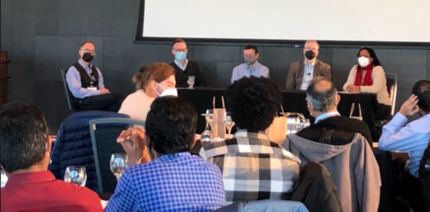This is an edited of the original Newsletter to include contributed articles only
Directors' Note
Integrating Social Science and Engineering

How does human decision-making strain the supply chain? What specific behaviors need to be measured to improve human-in-the-loop AI? When do people choose to disclose private information on social media, exposing themselves and their community to cyber threats? These questions all center on understanding the cognitive, behavioral, and social processes that link humans to our data-driven world each day.
Being able to answer these questions requires the full integration of cognitive, behavioral, and social sciences into interdisciplinary teams addressing these issues from many angles. Rigorous methodologies for obtaining and analyzing human subjects data are core to the various disciplines that address basic science questions about the fundamental nature of human thought and behavior. Bringing these tools and the deep disciplinary knowledge that goes with them to bear on interdisciplinary questions strengthens the scientific approaches and broadens the potential impact of interdisciplinary team science.
As an IRI, I-DISC embraces the mission of building and supporting interdisciplinary teams, as well as bringing many voices to the table, including those from the social sciences and humanities. Highlighted below are two examples of how I-DISC is approaching this work in the current semester.
As part of its ongoing evolution, the I-DISC Fellows program is expanding this spring to support faculty research that integrates cognitive, behavioral, and social science with data science and engineering. Alex Sackett joins the I-DISC Fellows team this spring. She is a 5th year Psychology PhD student with a strong background in social cognition, development of implicit and explicit measurement tools, and human subjects research more broadly. Alex will be working alongside returning I-DISC Fellow Dan Luo to expand the consulting services that the Fellows program offers to include support for faculty who seek support for various aspects of human subjects research. Possible topics include measurement and protocol development for online participant recruitment and data collection, and ethical considerations for human subjects research. Through this service to our members, I-DISC seeks to build capacity for and experience with interdisciplinary research that fully incorporates expertise in cognitive, behavioral, and social sciences into a wide range of research centered in all five of Lehigh’s colleges. Faculty interested in more information about the I-DISC Fellows program can find information as well as procedures for requesting fellows’ services on our website here.
On April 6, I-DISC will host our first Data and Computing Equity and Justice (DCEJ) Seminar featuring data journalist Meredith Broussard. Drawing from her experience as both a software developer and a journalist, Broussard focuses the critical lens of journalism and the structure of computer programming on questions of how individuals and society interact with and rely upon computers and technology. In her book Artificial Unintelligence, Broussard presents a series of case studies that explore the inherent limits of technology and the resulting dysfunction that arises when technology is blindly implemented. Her call for better choices in the use of technology will challenge all of us in the I-DISC community to consider our own decisions in research and technology development with respect to the social justice and equality of our actions.
Research Highlights
Foundations and Applications of Mathematical Optimization and Data Science (Lehigh MODS Program)

Lehigh University is world-renowned for research on mathematical optimization (MO), which involves the development of mathematical and computational tools that facilitate discovery, design, and decision-making throughout science, engineering, and business. Indeed, all major industries, scientific laboratories, public-sector organizations, and policy-making groups benefit from the use of MO tools. MO is also one of the key pillars of data science (DS), the field that is revolutionizing both science and society. MODS website >
"Here Today, Better Tomorrow" - Machine Learning in Practice & Supply Chain

I-DISC Hosts NSF TRIPODS+X ML & Supply Chain Management Workshop
"Most of the prominent recent applications of machine learning for supply chains were focused on descriptive or predictive analytics," says Larry Snyder, a professor of industrial and systems engineering at Lehigh and co-director of I-DISC, who served as a co-organizer of the TRIPODS+X event. "For example, clustering methods have been used to segment customers or suppliers in a descriptive way, and deep neural networks have been applied predictively to forecast demand. Our workshop took a bit of a different direction: we focused on the use of machine learning for prescriptive analytics within the supply chain—on using the power of machine learning not just to analyze, but to optimize, efficiency and resiliency across the global supply chain."
Researchers gather at NSF-funded 'Machine Learning & Supply Chain Management Workshop' at Lehigh University on Dec 13-14, 2021
Over the past 18 months, the phrase "global supply chain" has been as prominent as ever across news reporting and popular discussion.
With this global crisis swirling in the backdrop, Lehigh University's Institute for Data, Intelligent Systems, and Computation (I-DISC), with support from the National Science Foundation's TRIPODS+X program, convened a group of top researchers from across the country and around the world to explore innovative approaches to strengthening the global supply chain. Academic, industry, and government researchers focused on supply chain and logistics, artificial intelligence and machine learning, or associated fields were encouraged to attend.
"Most of the prominent recent applications of machine learning for supply chains were focused on descriptive or predictive analytics," says Larry Snyder, a professor of industrial and systems engineering at Lehigh and co-director of I-DISC, who served as a co-organizer of the TRIPODS+X event. "For example, clustering methods have been used to segment customers or suppliers in a descriptive way, and deep neural networks have been applied predictively to forecast demand. Our workshop took a bit of a different direction: we focused on the use of machine learning for prescriptive analytics within the supply chain—on using the power of machine learning not just to analyze, but to optimize, efficiency and resiliency across the global supply chain."
On December 13-14, 2021, preeminent researchers in the fields of artificial intelligence and supply chain management gathered at Lehigh's Iacocca Hall for the "TRIPODS+X Workshop on Machine Learning & Supply Chain Management," featuring speakers from academia and industry, to foster a vibrant exchange of ideas and to stimulate new collaborations. Due to the latest wave of COVID-19, the event was held in a hybrid format. More than 50 participants and speakers attended the event in-person, and an additional 144 participants attended remotely. Participants represented over 70 academic institutions and 10 companies, from the US and 21 other countries around the world including Europe, Middle East, Asia, and South America.
The workshop featured thirteen invited speakers, a poster session for students, and a panel discussion to promote further exploration at the intersection of machine learning and supply chain management. With the kind permission of the speakers, the workshop presentations and panel discussion can be viewed online here.
Based in part from RCEAS News Article 11.08.21


